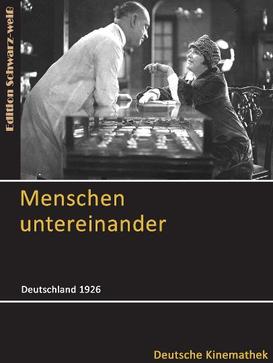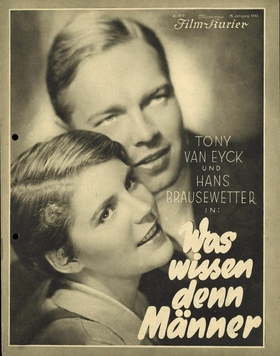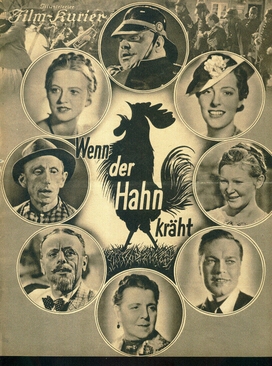Related Research Articles

Comedy of the Heart is a 1924 German silent romance film directed by Rochus Gliese and starring Lil Dagover, Nigel Barrie and Alexander Murski. It premiered at the Tauentzienpalast in Berlin on 30 September 1924. It was based on a novella by Sophie Hoechstetter. The film was one of UFA's major releases of the 1923-1925 boom period. It was made at the Babelsberg Studio.
We Belong to the Imperial and Royal Infantry Regiment is a 1926 German silent film starring Mary Kid, Paul Heidemann and Fritz Spira. The film's art direction was by Heinrich Richter. Oswald, an Austrian by birth, intended it as a tribute to the atmosphere of Imperial Vienna.

Under the Lantern is a 1928 German silent film directed by Gerhard Lamprecht and starring Lissy Arna, Gerhard Dammann and Mathias Wieman. The film's art direction was by Otto Moldenhauer.

People to Each Other is a 1926 German silent film directed by Gerhard Lamprecht and starring Alfred Abel, Aud Egede-Nissen, and Eduard Rothauser. The film's art direction was by Otto Moldenhauer.
Colette Brettel (1902–1973) was a British stage and film actress. Born Dorothy Nicolette Pettigrew in London, she made her screen debut in the 1920 film Wuthering Heights and appeared in several British films of the early 1920s including The Prodigal Son. Following the Slump of 1924, in which the number of British films released sharply declined, she moved to Germany. Her film career ended with the introduction of sound. She was married to the Dutch actor Ernst Winar.

Renate in the Quartet is a 1939 German musical comedy film directed by Paul Verhoeven and starring Käthe von Nagy, Hans Brausewetter and Gustav Fröhlich. It is based on a novel by Geog Albrecht von Ihering.

Back Then is a 1943 German drama film directed by Rolf Hansen and starring Zarah Leander, Hans Stüwe, and Rossano Brazzi. The film's sets were designed by Walter Haag. It was made at the Babelsberg Studio, by Universum Film AG, Germany's largest film company. It was Leander's final film of the Nazi era, as she returned to Sweden shortly afterwards. This was a blow for the German film industry, as she was the most popular and highest-paid star. Leander's next film was not for another seven years, when she made a comeback in Gabriela (1950).

The Imaginary Baron is a 1927 German silent comedy film directed by Willi Wolff and starring Reinhold Schünzel and Marlene Dietrich. It was made at the Tempelhof Studios in Berlin. The film's sets were designed by the art director Ernst Stern.
Paragraph 182 is a 1927 German silent drama film directed by Ernst Winar and starring Colette Brettel, Gerhard Ritterband and Eva Speyer.

Love Affairs is a 1927 German silent film directed by Jaap Speyer and starring Anita Dorris, Anton Pointner, and Albert Steinrück.

Gypsies of the Night is a 1932 German film directed by Hanns Schwarz and starring Jenny Jugo, Hans Brausewetter, and Paul Kemp. A separate French-language version Happy Hearts was also released.
Watch on the Rhine is a 1926 German silent historical film directed by Helene Lackner and starring Hans Mierendorff, Ernst Winar and Gustav Adolf Semler.
The Sea Cadet is a 1926 German silent drama film directed by Carl Boese and starring Walter Slezak, Gerd Briese and Fritz Alberti. It was shot at the Terra Studios in Berlin. The film's sets were designed by the art director Karl Görge.
Annemarie and Her Cavalryman is a 1926 German silent film directed by Erich Eriksen and starring Colette Brettel, Sig Arno, and Hans Junkermann.

The Weather Station is a 1923 German silent film directed by Carl Froelich and starring Mady Christians, Albert Steinrück and Hans Brausewetter.
The Graveyard of the Living is a 1921 German silent film directed by Gerhard Lamprecht and starring Guido Herzfeld and Hanni Weisse.

The Family without Morals is a 1927 Austrian silent film directed by Max Neufeld and starring Anna Kallina, Colette Brettel, and Carmen Cartellieri.

What Men Know is a 1933 German drama film directed by Gerhard Lamprecht and starring Hans Brausewetter, Erwin Kalser and Toni van Eyck. It was shot at the Babelsberg Studios in Berlin. The film's sets were designed by the art director Werner Schlichting. It was remade as the Swedish film What Do Men Know? the same year.

When the Cock Crows is a 1936 German comedy film directed by Carl Froelich and starring Heinrich George, Hans Brausewetter and Marianne Hoppe. It was shot at the National Studios in Berlin. The film's sets were designed by the art directors Walter Haag and Franz Schroedter. It is based on a folk play of the same title by August Hinrichs.
The Market of Life is a 1928 German silent film directed by Béla Balogh and starring Gustav Fröhlich, Hans Mierendorff and Vera Schmiterlöw. The film's sets were designed by the art director Karl Machus. It was released in Britain in 1929.
References
- ↑ Lamprecht p.332